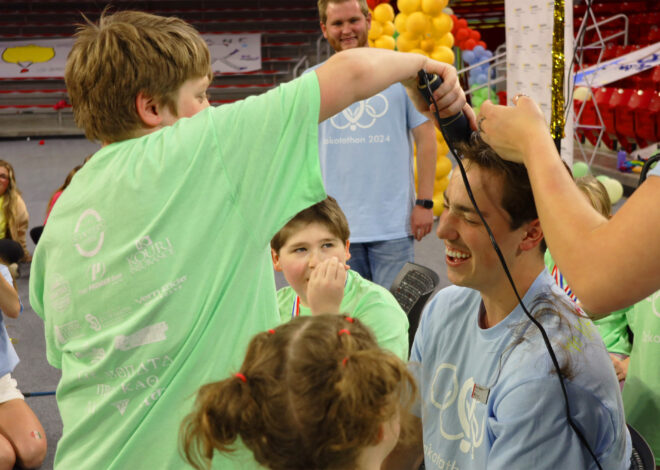
MUC staff aim to overhaul recycling program
The staff at the Muenster University Center is making efforts to reinvigorate its recycling program in order to ensure the program reaches its full potential.
Despite separate recycling bins being available in the MUC and around USD campus, Kyle Schoenfelder, MUC director since January, said custodians have been mixing recyclable trash with regular trash and not utilizing Vermillion’s recycling resource to have a greater sustainable footprint.
“The program will make us more sustainable and leave less of a carbon footprint,” Schoenfelder said. “When I was hired, none of the recycling was being taken out. The custodians would just throw it in the trash and take it out as trash.”
Multiple MUC custodians refused comment to The Volante about former recycling practices. Bob Iverson, the City of Vermillion’s landfill manager, said he cannot recall a problem with Missouri Valley Recycling receiving or receiving poorly-sorted recyclable items from the MUC.
First-year John Ricketts said he never saw recycling as a problem at USD but is glad to hear the MUC is taking the initiative to change any previous wrongdoing or inefficient practices.
“Obviously, it’s the right thing to do,” Ricketts said. “Recycling is popular among everybody. It’s something everybody knows needs to be done and needs to be done well. Students will catch on with recycling fast.”
Becky Chamberlin, a second-year graduate student working with Schoenfelder on the recycling program, said the problems were often beyond custodial work. She said students throw away trash in recycling bins, and that renders the recycling bins useless.
“By getting into a habit of recycling, we can all pitch in and help conserve the earth’s resources and show our commitment to the environment,” Chamberlin said. “If you look around the MUC right now, you see cans, bottles and papers everywhere. We as a University can make a huge impact if each person made the change to recycle those things, instead of throwing them away.”
Chamberlin will be helping manage the recycling bins regularly. She has made it one of her daily responsibilities to check the bins and work with the campus information desk staff as well.
The plan is to have two front desk staff workers and custodians will go around the MUC during the lunch hour and take out paper, plastic and aluminum items to the loading dock where it will be picked up by Missouri Valley Recycling the next morning.
Chamberlin said she wants the entire process smooth and in full-swing by Easter.
“I don’t want to leave it for someone else,” she said.
Schoenfelder said the new program was a decision between him and Vice President of Student Services Kim Grieve to move forward with a better program and work with USD’s Sustainability Department to make sure USD’s largest student-traffic area is environmentally friendly.
Meghann Jarchow, assistant professor of sustainability, said the sustainability club was told about problems with recycling in MUC and was eager to support making the change.
“In the past, recycling had been done by a student group and then the student group had stopped doing it, so recycling had stopped,” Jarchow said. “There was kind of a lapse in who would manage the work.”
Schoenfelder said other problems the MUC is addressing involves moving recycling bins to more student-friendly areas in the MUC as well as changing the look of the bins so that they are more noticeable.
Sophomore Abigail Pierce agrees with Schoenfelder about re-locating the bins.
“A lot of times, I have something I need to recycle and there isn’t a bin in sight,” Pierce said. “Or when I do find one it doesn’t even fit.”
The previous recycling bins were uniform in look with garbage cans, which “looked nice,” Schoenfelder said. But he said allowing them to look just like garbage cans made it easy for students to use them as trash bins.
“We want to create awareness that we are starting our recycling program,” Schoenfelder said. “Then we want a large campus community buy-in to the program, making sure people are recycling and taking time to throw recyclable-items in the right bins.”
For now, Schoenfelder said he wants to target the most commonly disposed items in the MUC: plastics and paper.
“We’re trying to target plastics especially,” he said. “You look at C-Store and they have a bunch of bottled soda, water, iced tea, etc. You don’t see much aluminum cans, but even with paper, more people are starting to throw into the recycle bin.”
Jarchow said what Shoenfelder and USD plan to do is exactly right for now and will move the university’s environment-friendly presence forward.
“Some people in the sustainability community describe recycling as the gateway drug,” she said. “It’s essential. We need to make sure people are recycling – it’s an opportunity to raise awareness and get people engaged so they can do even more.”


